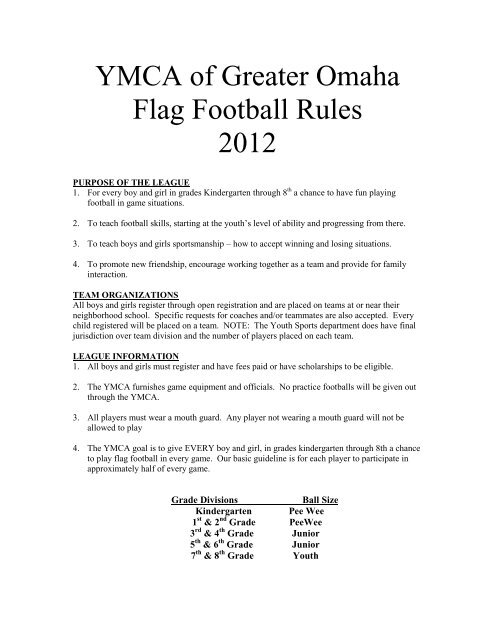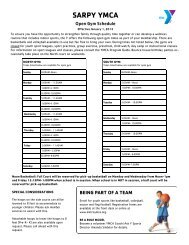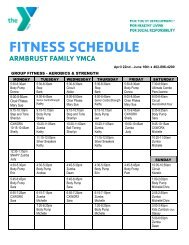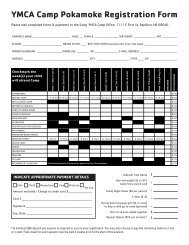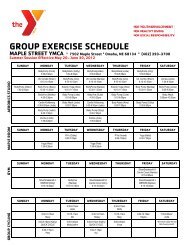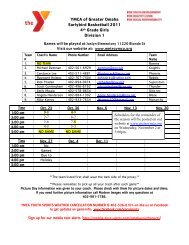Recreational Flag Football Rules - Youth Sports YMCA
Recreational Flag Football Rules - Youth Sports YMCA
Recreational Flag Football Rules - Youth Sports YMCA
You also want an ePaper? Increase the reach of your titles
YUMPU automatically turns print PDFs into web optimized ePapers that Google loves.
<strong>YMCA</strong> of Greater Omaha<br />
<strong>Flag</strong> <strong>Football</strong> <strong>Rules</strong><br />
2012<br />
PURPOSE OF THE LEAGUE<br />
1. For every boy and girl in grades Kindergarten through 8 th a chance to have fun playing<br />
football in game situations.<br />
2. To teach football skills, starting at the youth’s level of ability and progressing from there.<br />
3. To teach boys and girls sportsmanship – how to accept winning and losing situations.<br />
4. To promote new friendship, encourage working together as a team and provide for family<br />
interaction.<br />
TEAM ORGANIZATIONS<br />
All boys and girls register through open registration and are placed on teams at or near their<br />
neighborhood school. Specific requests for coaches and/or teammates are also accepted. Every<br />
child registered will be placed on a team. NOTE: The <strong>Youth</strong> <strong>Sports</strong> department does have final<br />
jurisdiction over team division and the number of players placed on each team.<br />
LEAGUE INFORMATION<br />
1. All boys and girls must register and have fees paid or have scholarships to be eligible.<br />
2. The <strong>YMCA</strong> furnishes game equipment and officials. No practice footballs will be given out<br />
through the <strong>YMCA</strong>.<br />
3. All players must wear a mouth guard. Any player not wearing a mouth guard will not be<br />
allowed to play<br />
4. The <strong>YMCA</strong> goal is to give EVERY boy and girl, in grades kindergarten through 8th a chance<br />
to play flag football in every game. Our basic guideline is for each player to participate in<br />
approximately half of every game.<br />
Grade Divisions<br />
Ball Size<br />
Kindergarten Pee Wee<br />
1 st & 2 nd Grade PeeWee<br />
3 rd & 4 th Grade Junior<br />
5 th & 6 th Grade Junior<br />
7 th & 8 th Grade <strong>Youth</strong>
EQUIPMENT AND UNIFORM<br />
1. The <strong>YMCA</strong> will furnish game footballs.<br />
2. Players should not wear anything that is dangerous to them or others; i.e. watches, rings,<br />
necklaces, etc.<br />
3. Game shirts are reversible red and black mesh jerseys. Players need to buy these jerseys at<br />
the time of registration.<br />
4. Individual flag belts and flags will be given to each coach at the beginning of the season.<br />
5. <strong>Football</strong>s will not be provided for practices, teams must furnish their own.<br />
6. Metal cleats are prohibited.<br />
7. Players must wear a mouth guard while they are playing.<br />
<strong>YMCA</strong> STAFF<br />
<strong>YMCA</strong> personnel shall be present and visible at all games. If you encounter any problems or<br />
have questions, please contact the site supervisor, official or the <strong>Youth</strong> <strong>Sports</strong> Director. If you<br />
have a question or suggestion concerning the game or league, please present it before or after the<br />
game to the site supervisor, NOT during the game. This can be distracting to the coaches,<br />
players, officials, and other fans.<br />
FAN CONDUCT AND SPORTSMANSHIP<br />
All coaches, parents and spectators shall remain off the field. Fans should remember only<br />
positive comments are appropriate in a youth sport setting. Fans should also remember that vocal<br />
instructions during the game could be confusing to the young athletes. Please let the coach<br />
handle this. Many times you may see calls that the official make differently than what you<br />
would. They are in charge of the game and we ask that the decisions be left up to their<br />
judgement. Coaches are responsible for their fan’s behavior. Know the <strong>YMCA</strong>’s rules and<br />
policies. Be courteous to opposing players, officials, coaches, and fans. Enjoy the game! That’s<br />
what our league is all about.<br />
These rules will be enforced:<br />
Step 1 – Warning<br />
Step 2 – Spectator asked to leave<br />
REFEREE<br />
1. The referee has jurisdiction from the time he/she enters the area of the play until signaling the<br />
end of the game. The referee’s decisions are final.<br />
2. The referee shall enforce the rules of the game.<br />
3. The referee can suspend or terminate a game whenever it is deemed necessary; for example<br />
interference by spectators or coaches.<br />
4. The referee can caution a player and eject from play any player quality of violent conduct,<br />
use of foul or abusive language, or persistent infringement of the playing rules. That player<br />
must sit out the next game.<br />
5. The referee shall officiate the coin toss for either receive or defend to winner of toss.<br />
6. Teams shall change sides at the completion of each half.<br />
7. Prior to coin flip, referee will have a pre-game meeting with coaches/captains from both<br />
teams to discuss basic game rules/procedures.
PLAYING RULES<br />
1. A coin toss determines first possession (teams switch possession at halftime)<br />
2. The offensive team takes possession of the ball at its 5-yard line and has three (3)<br />
plays to cross midfield. Once a team crosses midfield, it has three (3) plays to score a<br />
touchdown. If the offense fails to score, the ball changes possession and the new<br />
offensive team takes over on its 5-yard line.<br />
3. If the offensive team fails to cross midfield, possession of the ball changes and the<br />
opposition starts its drive from its 5-yard line.<br />
4. All possession changes, except interceptions, start on the offense’s 5-yard line.<br />
5. Coaches will be allowed in the huddle.<br />
6. Teams generally consist of 10 players (5 on the field with 5 substitutes)<br />
7. Game time is forfeit time. A game may be started and played with 4 players.<br />
8. Field Dimensions: Kind. & 1/2 nd Grade: 20x40yds, 3 rd Grade and up: 30x50yds<br />
9. ALL PLAYERS MUST PLAY HALF OF EVERY GAME!<br />
10. No blitzing will be allowed if a team is up by more than 21 points.<br />
Timing/Overtime<br />
1. Games are played with two 20 minute halves with a five minute halftime (No<br />
Overtime)<br />
2. Clock stops on timeouts and at the official’s discretion.<br />
3. Each time the ball is spotted, a team has 30 seconds to snap the ball. Teams will<br />
receive one warning before a delay-of-game penalty is enforced.<br />
4. Each team has one 60-second and one 30-second time out per half.<br />
Scoring<br />
Touchdown:<br />
Extra point:<br />
Safety:<br />
6 points<br />
1 point (played from 5-yard line, PASS ONLY) or<br />
2 points (played from 12-yard line RUN or PASS)<br />
2 points<br />
Running<br />
1. The quarterback cannot run with the ball.<br />
2. K-4 th Grades: Only direct handoffs behind the line of scrimmage are permitted.<br />
Teams may use multiple handoffs, but they must be behind the line of<br />
scrimmage.<br />
3. 5-8 th Grades: Direct handoffs and lateral/pitch are permitted only behind the<br />
line of scrimmage. Offense may use multiple handoffs, but are allowed only one<br />
lateral or pitch.<br />
4. 1 st -8 th Grades “No-running zones,” located 5 yards from each end zone and 5<br />
yards on either side of midfield, are designed to avoid short-yardage, powerrunning<br />
situations.<br />
5. The player who takes the handoff or pitch/lateral can throw the ball from behind the<br />
line of scrimmage.<br />
6. Once the ball has been handed off or pitched, all defensive players are eligible to<br />
rush.
7. Spinning is allowed, but players cannot leave their feet to avoid a defensive player<br />
(no diving).<br />
8. The ball is spotted where the ball carrier’s feet are when the flag is pulled, not where<br />
the ball is.<br />
Receiving<br />
1. All players are eligible to receive passes (including the quarterback if the ball has<br />
been handed off behind the line of scrimmage).<br />
2. As in the NFL, only one player is allowed in motion at a time.<br />
3. A player must have at least one foot inbounds when making a reception.<br />
Passing<br />
1. All forward passes must be received beyond the line of scrimmage.<br />
2. Shovel passes are allowed but must be received beyond the line of scrimmage.<br />
3. The quarterback has a seven-second “pass clock.” If a pass is not thrown within<br />
seven seconds, play is dead, loss of down. Once the ball is handed off, the sevensecond<br />
rule is no longer in effect. K-2 nd Grades: Interceptions change the<br />
possession of the ball at the point of interception. Interceptions are the only<br />
changes of possession that do not start on the 5-yard line. Interceptions may not<br />
be returned by the defense.<br />
4. 3-8 th Grades: Interceptions can be returned and possession starts from the point<br />
of the flag pull. An interception is the only change of possession that does not<br />
start on the 5-yard line.<br />
Dead Balls<br />
1. The ball must be snapped between the legs, not off to one side, to start play.<br />
2. Substitutions may be made on any dead ball.<br />
3. Play is ruled “dead” when:<br />
A. Ball carrier’s flag is pulled.<br />
B. Ball carrier steps out of bounds.<br />
C. Touchdown or safety is scored.<br />
D. Passer throws the ball from beyond the line of scrimmage.<br />
E. Ball carrier’s knee hits the ground.<br />
F. Ball carrier’s flag falls out.<br />
Note: There are no fumbles. The ball is spotted where the ball hits the ground.<br />
Rushing the Quarterback<br />
1. All players who rush the passer must be a minimum of seven yards from the line of<br />
scrimmage when the ball is snapped. Any number of players can rush the<br />
quarterback. Players not rushing the quarterback may defend on the line of<br />
scrimmage. Once the ball is handed off, the seven-yard rule no longer is in effect,<br />
and all defenders may go behind the line of scrimmage. A special marker, or the<br />
referee, will designate seven yards from the line of scrimmage. Remember, no<br />
blocking or tackling is allowed.
<strong>Sports</strong>manship/Roughing<br />
1. If the site supervisor or referee witness any acts of tackling, elbowing, cheap shots,<br />
blocking, or any unsportsmanlike act, the game will be stopped and the player will be<br />
ejected from the game. FOUL PLAY WILL NOT BE TOLERATED.<br />
2. Trash talking is illegal. Officials have the right to determine offensive language.<br />
(Trash talk is talk that may be offensive to officials, opposing players, teams, or<br />
spectators.) If trash talking occurs, the referee will give one warning. If it continues,<br />
the players or players will be ejected from the game.<br />
Penalties<br />
Defense:<br />
Offsides (dead ball)<br />
5 yards, repeat down<br />
Interference<br />
10 yards and automatic first<br />
down<br />
Illegal contact (holding, blocking, etc.)<br />
10 yards and automatic first<br />
down<br />
Illegal flag pull (before receiver has ball)<br />
10 yards and automatic first<br />
down<br />
Illegal rushing (From inside 7-yard marker)<br />
10 yards and automatic first<br />
down<br />
Offense:<br />
Illegal motion<br />
5 yards, repeat down<br />
(more than one person moving, false start, etc.)<br />
Illegal forward pass<br />
5 yards and loss of down<br />
(pass received behind line of scrimmage)<br />
Offensive pass interference<br />
10 yards and loss of down<br />
(illegal pick play, pushing off/away defender)<br />
<strong>Flag</strong> guarding<br />
10 yards (from line of scrimmage) and loss<br />
of down<br />
Delay of game (dead ball)<br />
Clock stops, 10 yards and loss of down<br />
1. Referees determine incidental contact that may result from normal run of play. All<br />
penalties will be assessed from the line of scrimmage.<br />
2. Only the team captain may ask the referee questions about rule clarification and<br />
interpretations. Players cannot question judgment calls.<br />
3. Games cannot end on a defensive penalty, unless the offense declines it.


